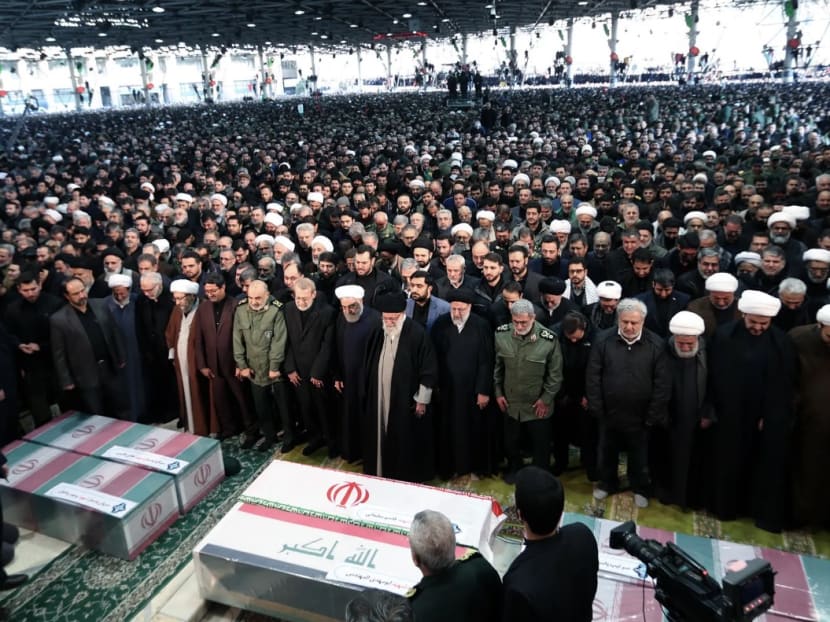China’s growing anxiety over US-Iran tensions
The negative ripple effects of the assassination of Iran’s General Qassem Soleimani that are reverberating beyond the Middle East are affecting several countries, not least China. China’s objective in the region is simple: To avoid escalation.

Iran's Supreme Leader Ayatollah Ali Khamenei and Iranian President Hassan Rouhani among those who prayed near the coffin of Iranian Major-General Qassem Soleimani in Tehran, Iran, Jan 6.
After the Iranian Revolutionary Guards Corp fired ballistic missiles at two Iraqi military bases hosting United States military personnel, the world held its breath. US President Donald Trump had threatened massive retaliation if Iran had hit back after the assassination of General Qassem Soleimani, and the spectre of military escalation spooked much of the globe.
The missile attacks targeted an air force base of Ain al Asad in the western part of Iraq and another base in proximity of the northern city of Erbil, both of which house American troops and equipment.
No casualties were recorded, however, and what the Iranian government called a proportionate reaction to the killing of Gen Soleimani did not draw the expected reaction from Washington.
Instead, in a statement early Thursday (Jan 9) morning (Singapore time), Mr Trump appeared to open a small window to diplomacy when he declared that Iran “appears to be standing down” and signalled that the US does not intend to take further kinetic operations.
The oil market appeared unfazed by the Iranian attack, and global stock markets rallied after Mr Trump’s statement, interpreting it as a move to cool tensions.
Nevertheless, the assassination of a general who was effectively Iran’s No 2 has increased the probability for miscalculations and the overall geopolitical volatility. The negative ripple effects that are reverberating beyond the Middle East are affecting several countries, not least China.
In recent years, Beijing has played the diplomatic game between Saudi Arabia and Iran skillfully, by attributing great importance to the bilateral relationship between the two countries. China’s objective in the region is simple: To avoid escalation.
This explains China’s relatively mild reaction to Gen Soleimani’s killing — Foreign Minister Wang Yi, during a call with his Iranian counterpart Javad Zarif, simply said the US should not "abuse force" and instead seek solutions through dialogue.
Avoiding shrill condemnation in a bid to keep things on an even keel is China’s response to the alarming prospect it faces: An enforced US military withdrawal from Iraq and a rogue Iran that is set on the path of revenge will mean an even more volatile Middle East, affecting China’s national security in several areas, from energy supply to securing its citizens and infrastructure investments in the region.
China is also close to signing a truce of sorts in the trade war with the US. According to news reports, a high-level Chinese delegation will be in Washington on Jan 13, although President Trump has said a “Phase One” trade deal will be signed on Jan 15.
With a deal appearing so tantalisingly close, China has opted not to rock the boat, especially since its growing investments in the Middle East have already been hit hard.
American sanctions against Iran have already created an unfavourable situation for China. As the world’s largest oil consumer and importer, China has already seen one source of oil closed to it because of the sanctions.
Though it has diversified its supply, it remains vulnerable to sudden fluctuations and disruptions in the energy market. Any trouble involving Iran and the Strait of Hormuz would compromise its energy security.
China’s long-term interests in Iran are not exclusively related to oil and trade. An unstable Iran or, worse, a rogue Iran, could severely destabilise President Xi Jinping’s ambitious Belt and Road Initiative (BRI).
Recent pledged investment from China in Iran, amounting to US$280 billion (S$378 billion) in developing the country’s petrochemical sector and US$120 billion in logistic and manufacture infrastructure upgrades, are just part of the BRI blueprint for the region.
This is why China is opposed to any change to the status quo in the Middle East. Regime change, a new conflict, and nuclear weapons proliferation in Iran will all upset China’s best-laid plans and prove costly for it.
The changing security architecture in the Middle East is also proving problematic for Beijing. Free riding on the US military is no longer a viable path, especially since the prospect of an enforced American withdrawal is very much in play.
This means China will have to construct an alternative security umbrella to protect its citizens and infrastructural investments in the region.
The Chinese government’s playbook, based on the decade-old principle of non-interference, plays badly with President Trump’s perpetually changing politics.
China could also casting worried glances towards the east from time to time, wondering if Mr Trump has any bold gambles in mind for North Korea, the same way he did for Iran.
As has already happened in Afghanistan, it seems that everybody in the Middle East wants the Americans to leave, but nobody wants them to leave too soon.
ABOUT THE AUTHOR:
Dr Alessandro Arduino is Principal Research Fellow at the Middle East Institute, National University of Singapore.






